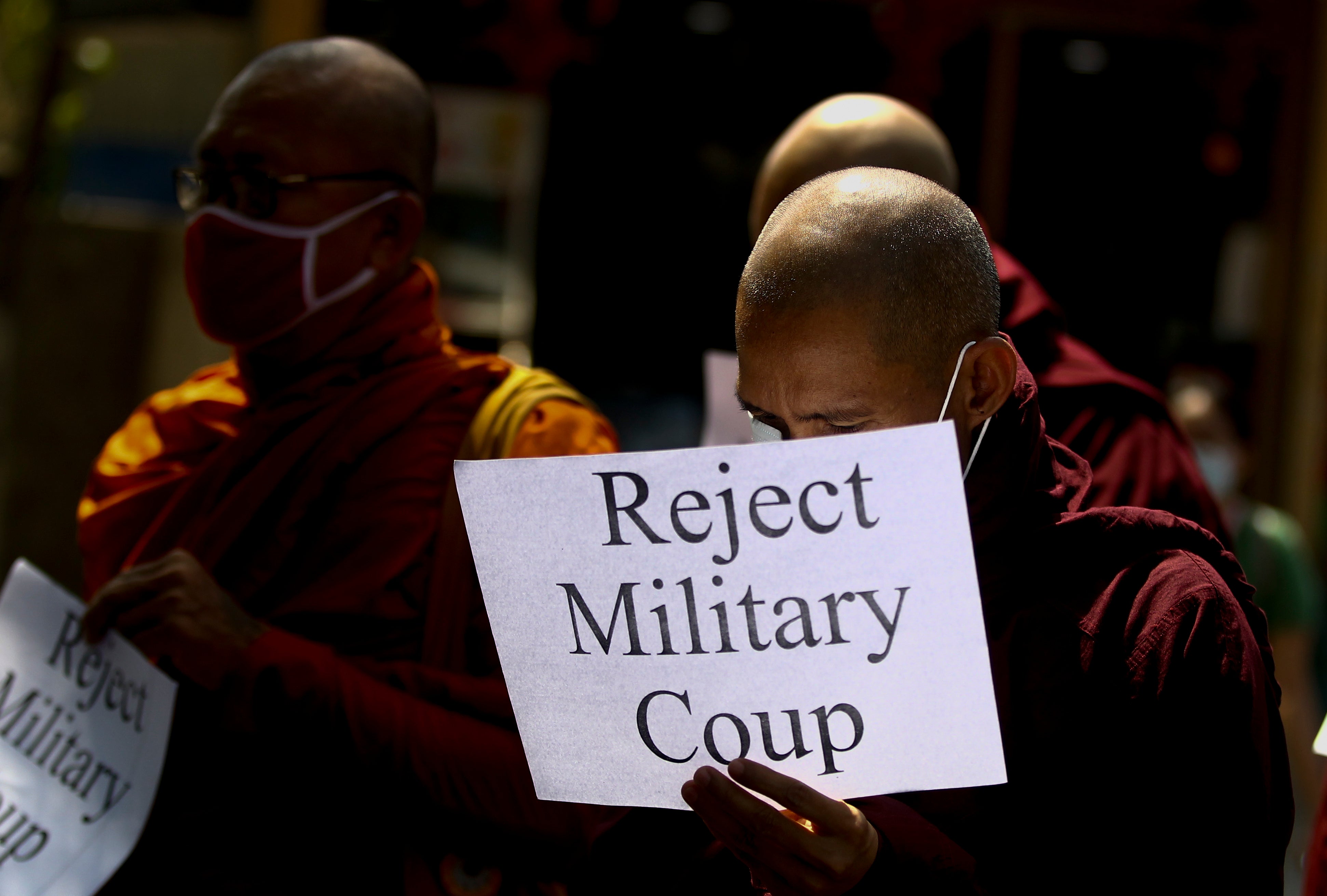UN expert fears violence with troops sent to Myanmar city
The U.N. expert on human rights in Myanmar has warned of the prospect for major violence as demonstrators gather again Wednesday to protest the military’s seizure of power

Your support helps us to tell the story
From reproductive rights to climate change to Big Tech, The Independent is on the ground when the story is developing. Whether it's investigating the financials of Elon Musk's pro-Trump PAC or producing our latest documentary, 'The A Word', which shines a light on the American women fighting for reproductive rights, we know how important it is to parse out the facts from the messaging.
At such a critical moment in US history, we need reporters on the ground. Your donation allows us to keep sending journalists to speak to both sides of the story.
The Independent is trusted by Americans across the entire political spectrum. And unlike many other quality news outlets, we choose not to lock Americans out of our reporting and analysis with paywalls. We believe quality journalism should be available to everyone, paid for by those who can afford it.
Your support makes all the difference.The U.N. expert on human rights in Myanmar warned of the prospect for major violence as demonstrators gather again Wednesday to protest the military’s seizure of power.
U.N. rapporteur Tom Andrews said he had received reports of soldiers being transported into Yangon the biggest city, from outlying regions.
“In the past, such troop movements preceded killings, disappearances, and detentions on a mass scale,” he said in a statement issued by his office in Geneva. “I am terrified that given the confluence of these two developments - planned mass protests and troops converging - we could be on the precipice of the military committing even greater crimes against the people of Myanmar.”
More protests were expected Wednesday all over the country despite the possibility of violence by the army and police.
“Let’s march en masse. Let’s show our force against the coup government that has destroyed the future of youth and our country,” Kyi Toe, a spokesman for the National League for Democracy party of ousted leader Aung San Suu Kyi wrote on his Facebook page late Tuesday.
On Monday in Mandalay, the country’s second biggest city, security forces pointed guns at a group of 1,000 demonstrators and attacked them with slingshots and sticks. Local media reported that police also fired rubber bullets into a crowd and that a few people were injured.
The protests are taking place in defiance of an order banning gatherings of five or more people.
Police filed a new charge against Suu Kyi, her lawyer said Tuesday, a move likely to fuel further public anger.
Suu Kyi, who was detained in the Feb. 1 military takeover, already faced a charge of illegally possessing walkie-talkies — an apparent attempt to provide a legal veneer for her house arrest. The new charge accuses her of breaking a law that has been used to prosecute people who have violated coronavirus restrictions, lawyer Khin Maung Zaw told reporters after meeting with a judge in the capital, Naypyitaw. It carries a maximum punishment of three years in prison.
British Prime Minister Boris Johnson issued a strong denunciation of the legal maneuver against Suu Kyi.
“New charges against Aung San Suu Kyi fabricated by the Myanmar military are a clear violation of her human rights,” he tweeted. “We stand with the people of Myanmar and will ensure those responsible for this coup are held to account.”
A spokesman for the United Nations said any new charges against Suu Kyi don’t change the world body’s “firm denunciation” of the military overturning the “democratic will of the people” and arresting political leaders, activists and peaceful protesters.
“We have called for charges against her to be dropped, for her to be released,” Stéphane Dujarric said.
The coup has brought a shocking halt to Myanmar’s fragile progress toward democracy, most visible in Suu Kyi’s tenure as national leader.
For a third night in a row, the military ordered an internet blackout — almost entirely blocking online access from 1 a.m. to 9 a.m. It has also prepared a draft law that would criminalize many online activities.
While the military did not say why the internet was blocked, there is widespread speculation that the government is installing a firewall system to allow it to monitor or block online activity. Social media users have speculated widely that neighboring China, with extensive experience in censoring the internet, was giving technical assistance for such a project.
China has so far not condemned the takeover. Some protesters have accused Beijing — which has long been Myanmar’s main arms supplier and has major investments in the country — of propping up the junta.
China’s ambassador said Beijing has friendly relations with both Suu Kyi’s party and the military, according to the text of an interview posted on the embassy’s Facebook page Tuesday. Chen Hai said he wished the two sides could solve their differences through dialogue.
“The current development in Myanmar is absolutely not what China wants to see,” he said.
Chen also denied that China was helping Myanmar to control its internet traffic and that Chinese soldiers were showing up on the Myanmar’s streets.
“For the record, these are completely nonsense and even ridiculous accusations,” Chen said.
The military contends there was fraud in last year’s election, which Suu Kyi’s party won in a landslide, and says it will hold power for a year before holding new elections. The election commission found no evidence to support the claims of fraud.